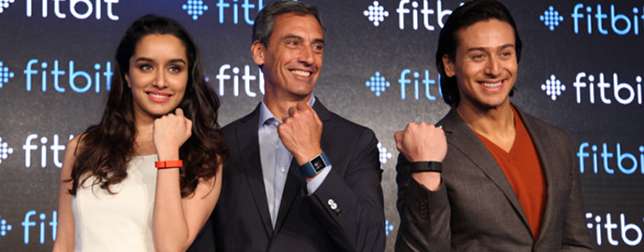India is the world’s youngest nation with nearly 60% of population below average age of 35 years. Wearable devices in the country recorded huge growth with a value CAGR of over 140% during 2013-2017. Basic wearables account for over 85% of total shipments in the India.
The wearable market benefits from features like heart rate monitoring, all day stress tracking, sleep tracking, VO2 Max data, calories burnt and activity measurement.
Fitbit has close to 60 percent market share of the health and fitness trackers in India and more than 80 percent of the market for devices priced above $100.
Read more With Fitbit Ace For Kids, Fitbit Now Has Fitness Tracker For Every Member of the Family
Although wearables market is expected to nearly double worldwide by 2021, and consumers in India bought another 2.7 million wearables last year, the country’s gadget market is showing sluggishness. People in India are no longer rushing out to buy wearables at the same fervent pace as in year’s past. At the same time, new brands are crowding the market already packed with competitors, making matters even worse.
Apparently unabashed by the headwinds, Fitbit is aiming to grab a bigger share of the wearables category in India by offering customers in the country with a wide lineup of smartwatches and fitness trackers.
“In addition to the low entry price of basic wearables, consumers are now getting better value from these devices as the category now offers advanced features,” said Celso Gomes, associate market analyst – client devices, IDC India. “Features such as heart rate, sleep monitor and among others are soon becoming the must-have features in basic wearables, even in entry-level (less than $50) segments.”
In affordable wearables section, GOQii leads the market in India, according to IDC data. The company is focused on building a unique wellness proposition with lifestyle doctor, personalized coaching, and health locker available as a subscription.
Read more Consumers Continue to Shift Focus From Basic Wearables to Smarter Devices
Xiaomi’s Mi Band due to its popularity and affordable price has brought considerable success to the company as well.
Other smartphone makers such as Lenovo and Honor are also looking to follow Xiaomi’s efforts with wearables targeting the Indian market. Lenovo recently introduced 2 fitness bands – the HX03 Cardio and HX03F Spectra – to the Indian consumers.
The market in India, with around 2 million units in 2017, is expected to reach 3 million units in 2018, according to Sebastian Peng, Head of Lenovo MBG Ecosystem. Peng said his company has great expectations for the Indian market where wearable sales is projected to gain increase remarkably in the coming years.
Navkendar Singh, associate research director, devices – India and South Asia, IDC India, believes Fitbit’s focus on health and fitness, which is viewed as their areas of expertise has helped the company build a robust brand in the fitness wearables category.
“Fitbit has been rather slow in seeing the demand for smartwatches, where Apple has been dominant lately,” said Singh. “But the strength of Fitbit Ionic and Versa, apart from the price, is the battery life of around five days, which remains a challenge for the smartwatch category.”










